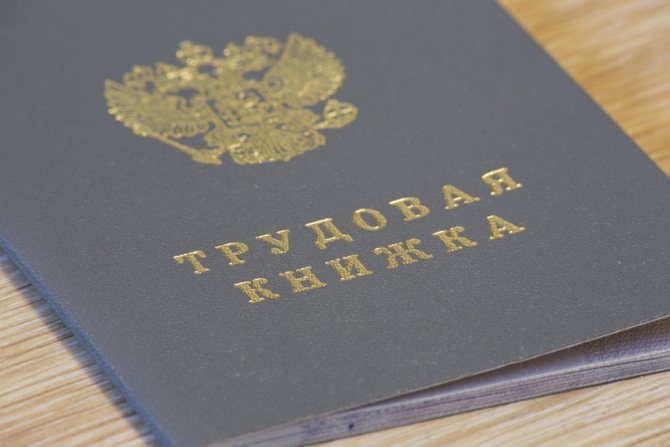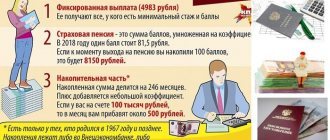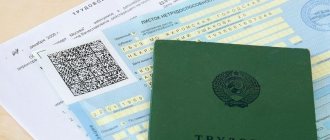What is considered a non-insurance period when calculating a pension?
According to Art. 12 of Federal Law No. 400-FZ “On Insurance Pensions” dated December 28, 2013, non-insurance periods include:
- caring for a child until he reaches the age of 1.5 years, but not more than 4.5 years in total;
- caring for a disabled person of group I, a disabled child or a person over 80 years old;
- residence of spouses of military personnel performing military service under a contract, together with their spouses, in areas where they did not work due to lack of employment opportunities (for a total period of no more than 5 years);
— temporary removal from office (work) due to unfounded criminal prosecution and subsequent rehabilitation;
- military service, service in internal affairs bodies, the State Fire Service, agencies for control of the circulation of narcotic drugs and psychotropic substances, institutions and bodies of the penal system, other service during which compulsory pension insurance did not apply.
Special insurance experience
A separate type of insurance experience is special insurance experience. This concept implies the total duration of periods of work in difficult climatic, territorial conditions and in industries unfavorable for health.
Special length of service provides the opportunity for early retirement or based on length of service. The list of categories of professions is given in lists No. 1 and No. 2. For example, contract military personnel, test pilots, and employees working in prisons retire early due to length of service.
Special experience is also calculated on the basis of the information entered in the work book based on the established calendar calculation principle. In specific cases, a preferential settlement procedure with special coefficients is used. For example, when a person worked at a facility with a high level of radiation.
In 2020, the minimum insurance period for an old-age pension is 10 years. By 2025, a pensioner must have accumulated at least 15 years of insurance coverage. Contributions made to the individual account of the future pensioner have been taken into account since 2002 when calculating compensation.
Are points awarded for non-insurance periods?
Pension points are awarded for non-insurance periods. In one calendar year a person can receive:
1.8 points - for the period of military service under conscription;
Question answer
How are pensions indexed for working pensioners after dismissal?
1.8 points - for the period of residence of spouses of military personnel serving under contract in areas where they did not work due to lack of employment opportunities;
1.8 points - for the period of unjustified detention;
1.8 points - for the period of caring for a disabled child, a disabled person of group I;
1.8 points - for the period of care by one of the parents for the first child up to 1.5 years;
3.6 points - for the period of care by one of the parents for the second child up to 1.5 years;
5.4 points - for the period of care by one of the parents for the third (fourth) child up to 1.5 years.
This number of points will be awarded if the citizen did not work during this period. If, for example, a person worked while on parental leave, he will be able to choose which points to use when calculating his pension: for work or for the non-insurance period.
The period of child care - the non-insurance period - is counted towards the length of service
19 February 2020 15:44
The PFR branch for the city of Moscow and the Moscow region reminds that since 2020, the old-age insurance pension is formed in pension coefficients: the more there are, the higher the pension amount.
Coefficients can be formed for both insurance and non-insurance periods. The periods of work during which insurance contributions to the Pension Fund are paid for a citizen are called insurance periods. Non-insurance periods - when a citizen does not work and employers do not make contributions to compulsory pension insurance for him, but his pension rights to an insurance pension are formed. In particular, these include the period of child care.
According to Art. 12 of the Federal Law of December 28, 2013 No. 400-FZ “On Insurance Pensions”, the period of care of one of the parents for each child until he reaches the age of one and a half years, but not more than six years in total, is included in the insurance period. Coefficients are awarded for no more than 4 children.
Also, the period of caring for a disabled child may be included in the insurance period if the corresponding period is not included in the insurance period for the other parent when establishing his insurance pension. Pension coefficients are calculated for these periods.
Thus, for one calendar year the following coefficients are established:
- 1.8 coefficient – period of care for a disabled child, group I disabled person;
- 1.8 coefficient – the period of care of one of the parents for the first child up to 1.5 years;
- 3.6 coefficient – the period of care of one of the parents for the second child up to 1.5 years;
- 5.4 coefficient – the period of care of one of the parents for the third (fourth) child up to 1.5 years.
Coefficients will be calculated if during this period the citizen was not in an employment relationship.
If a citizen worked while on parental leave, he will have the right to choose which coefficients to use when calculating his pension: either for work or for the non-insurance period. If several periods included in the insurance period coincide in time, then only one of them is taken into account when assigning a pension.
The territorial body of the Pension Fund of the Russian Federation takes into account the period that gives the right to an insurance pension and (or) to determine the value of the individual pension coefficient at a higher rate. A citizen who applies for a pension can indicate in the application the period he has chosen to be included in the insurance period.
Periods of child care are counted in the insurance period if they were preceded and (or) followed by periods of work and (or) other activities (regardless of their duration), for which insurance premiums for compulsory pension insurance were paid. This allows parents to formulate their pension rights and obtain the right to an insurance pension. When calculating the insurance pension, all annual pension coefficients are summed up, including coefficients for non-insurance periods.
You can find out about your formed rights in your personal account on the official website of the Pension Fund https://es.pfrf.ru, on the government services portal, in the PFR mobile application, as well as in the PFR Client Service or MFC.
IMPORTANT! Non-insurance periods - caring for children under 1.5 years of age, caring for disabled citizens, military service upon conscription - are not included in the insurance period, which gives the right to an early pension for long service (42 years for men and 37 years for women). .
Let us remind you that in order to receive an old-age insurance pension in 2019, you must have at least 10 years of experience and 16.2 pension coefficient. Every year the number of coefficients and length of service will increase until it becomes equal to 30 and 15, respectively. The maximum number of pension coefficients that can be “earned” in 2020 is 9.13.
Requirements for proof of experience
To confirm experience in accordance with Art. 13, 14 Federal Law No. 400, as well as the rules for calculating the insurance period (Resolution of the Government of the Russian Federation No. 15 of 2014), information is collected that confirms the personalized accounting of the applicant’s employment. If the periods of work coincide, the one that will have a greater impact on the amount of the pension is selected.
Experience is calculated using:
- work book, a duplicate is also taken into account;
- labor agreement with the employer, including a civil law one. Employment under GPC agreements is taken into account from 01/01/1997;
- military identification cards;
- certificate from the employment center, accounting department;
- archival extracts;
- the testimony of witnesses is taken into account. Information from two or more people is taken if lost documents cannot be recovered.

Periods of work as a nanny or housekeeper are taken into account only when concluding a GPC agreement with the employer and a certificate of payment by the latter of insurance payments for the employee. This condition also applies to workers in creative professions under copyright or licensing agreements.
The activities of lawyers, notaries, private detectives and other persons who provide employment on their own are confirmed by a certificate from the local Pension Fund or the Federal Tax Service on the transfer of mandatory payments.
If, when calculating a pension, experience was not taken into account, for example, caring for a disabled person, a request is sent to the Pension Fund with a request to provide a reasoned answer as to why they refused. If the answer is provided, but the applicant is not satisfied with the decision of the Pension Fund, a statement of claim is filed with the judicial authority. A citizen has the right to appeal the decision of the Pension Fund within a three-year period from the date the decision was made. However, it should be taken into account that procedural proceedings with the Pension Fund of the Russian Federation are considered a complex category of cases, so it is better to involve a lawyer in the process.
What length of work experience is taken into account?
What length of service is taken into account when calculating the labor pension? The total period up to 2002 is calculated, which includes professional employment and other socially useful activities. When calculating the length of service for a pension, the following periods are taken into account, which do not interrupt the total length of service (RF Law No. 1032-1 of April 19, 1991):
- military conscription;
- years of maternity leave;
- creative work of theater workers, writers, poets, etc.;
- being on sick leave;
- extra-long stay in places of detention pending re-examination of the case;
- being in unemployed status and receiving benefits;
- moving to work as assigned by the employment center;
- involvement in socially useful work on a paid basis;
- other employment.
These periods are calculated according to the calendar for the days actually worked. Work in navigation and seasonal work is counted towards the calendar year of work, regardless of the actual duration. For independent calculations, see the article “How to calculate the length of service for a pension: calculator.”
Counting Features
Continuous work experience does not affect the amount of the pension. This mattered during the Soviet era, when the calculation of pensions, benefits and benefits depended on the length of service. However, for certain professions the relevance of continuous professional experience has not lost its importance. For example, to receive compensation for citizens working in difficult climatic conditions (Order of the Ministry of Labor No. 3 of 1990).
To understand how the length of service for a pension is calculated, you can use an online calculator. But the calculation will be inaccurate. This applies to those circumstances when there are no supporting documents and the fact of work will have to be proven in court.
It is not difficult to calculate the length of service for a pension yourself. It is enough to add up the calendar segments of work for each position, as well as the employment that is legally included in the length of service. You can write down working periods on a piece of paper in chronological order, subtracting the date of starting a new job from the date of dismissal. Then all periods are added up and converted into accepted units of counting - months, years.

Upon termination of the employment relationship, the calculation of terms begins on the day that follows the day of dismissal, and not from the date specified in the dismissal order (Article 14 of the Labor Code of the Russian Federation). Correct calculation of length of service is needed not only for calculating pensions, but also for paying sick leave benefits and other social benefits.
Amount of pension supplement for children
The type of surcharge under consideration has an individual purpose. There are a number of factors that influence the calculation.
These include:
- number of children;
- the amount of earnings in the selected period of time;
- the amount of total labor output;
- authority to receive a pension payment;
- area of residence.
If a citizen has a low level of earnings, as well as a lot of experience, then the point system is a beneficial solution for him. Also, and vice versa, new rules for making calculations may affect the reduction of length of service and will show a negative value. Then the value received will be less than what is already paid to the person.
Then the employees of the pension authority make a negative decision, which deprives the person of receiving a recalculation. In a situation where a pensioner is supported by persons who are minors, the legislation states that the person is entitled to an additional payment. It has a fixed expression.
At the same time, it is worth paying attention to the fact that additional payment can be received not only for children, but also for grandchildren and brothers:
- if they have not reached the age of majority;
- when the age is less than 23 years, provided that the child is studying at a secondary or higher vocational institution;
- There is no age limit for persons who have disabled status.
The value depends on several factors, including how many citizens the pensioner cares for, what age he and his wards are, and whether the person has a disability. The person's area of residence will be taken into account. Since the beginning of the year, the payment is equal to 5334 rubles.
A different value is established in a situation where a person has not reached the age of 80 and is caring for a student under 23 years of age, then the payment will be 1,778 rubles, when there are 2 persons supported - 3,556. If there are three or more - 5,334.
When a pensioner reaches the age limit of 80 years and supports a person up to 23 years old, then the amount for 1 will be 7112 rubles, for 2 – 8890, for 3 – 10668 rubles. If a citizen lives in an area classified as northern or equivalent to it, then the value is subject to adjustment depending on the applied coefficient. The amount is influenced by the number of years worked in a given area.











